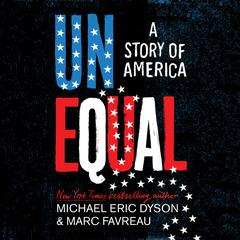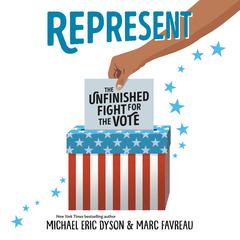 Play Audiobook Sample
Play Audiobook Sample
What Truth Sounds Like: Robert F. Kennedy, James Baldwin, and Our Unfinished Conversation About Race in America Audiobook
 Play Audiobook Sample
Play Audiobook Sample
Quick Stats About this Audiobook
Total Audiobook Chapters:
Longest Chapter Length:
Shortest Chapter Length:
Average Chapter Length:
Audiobooks by this Author:
Publisher Description
This program is read by the author. What Truth Sounds Like is a timely exploration of America's tortured racial politics that continues the conversation from Michael Eric Dyson's New York Times bestseller Tears We Cannot Stop. President Barack Obama: "Everybody who speaks after Michael Eric Dyson pales in comparison.” In 2015 BLM activist Julius Jones confronted Presidential candidate Hillary Clinton with an urgent query: “What in your heart has changed that’s going to change the direction of this country?” “I don’t believe you just change hearts,” she protested. “I believe you change laws.” The fraught conflict between conscience and politics – between morality and power – in addressing race hardly began with Clinton. An electrifying and traumatic encounter in the sixties crystallized these furious disputes. In 1963 Attorney General Robert Kennedy sought out James Baldwin to explain the rage that threatened to engulf black America. Baldwin brought along some friends, including playwright Lorraine Hansberry, psychologist Kenneth Clark, and a valiant activist, Jerome Smith. It was Smith’s relentless, unfiltered fury that set Kennedy on his heels, reducing him to sullen silence. Kennedy walked away from the nearly three-hour meeting angry – that the black folk assembled didn’t understand politics, and that they weren’t as easy to talk to as Martin Luther King. But especially that they were more interested in witness than policy. But Kennedy’s anger quickly gave way to empathy, especially for Smith. “I guess if I were in his shoes…I might feel differently about this country.” Kennedy set about changing policy – the meeting having transformed his thinking in fundamental ways. There was more: every big argument about race that persists to this day got a hearing in that room. Smith declaring that he’d never fight for his country given its racist tendencies, and Kennedy being appalled at such lack of patriotism, tracks the disdain for black dissent in our own time. His belief that black folk were ungrateful for the Kennedys’ efforts to make things better shows up in our day as the charge that black folk wallow in the politics of ingratitude and victimhood. The contributions of black queer folk to racial progress still cause a stir. BLM has been accused of harboring a covert queer agenda. The immigrant experience, like that of Kennedy – versus the racial experience of Baldwin – is a cudgel to excoriate black folk for lacking hustle and ingenuity. The questioning of whether folk who are interracially partnered can authentically communicate black interests persists. And we grapple still with the responsibility of black intellectuals and artists to bring about social change. What Truth Sounds Like exists at the tense intersection of the conflict between politics and prophecy – of whether we embrace political resolution or moral redemption to fix our fractured racial landscape. The future of race and democracy hang in the balance. More praise for What Truth Sounds Like: "Dyson's passion for the rich African-American cultural tapestry reverberates in this audiobook." — AudioFile Magazine “What Truth Sounds Like is a tour de force of intellectual history and cultural analysis, a poetically written work that calls on all of us to get back in that room and to resolve the racial crises we confronted more than fifty years ago.” —Harry Belafonte
Download and start listening now!
“Dyson has finally written the book I always wanted to read. I had the privilege of attending the meeting he has insightfully written about, and it’s as if he were a fly on the wall. What Truth Sounds Like is a tour de force of intellectual history and cultural analysis, a poetically written work that calls on all of us to get back in that room and to resolve the racial crises we confronted more than fifty years ago.”
— Harry Belafone, actor and social activist
Quotes
-
“Dyson delivers a piercing and wide-ranging analysis of American race relations…a poignant take on still-festering racial tensions in the United States.”
— Publishers Weekly -
“[A]n incisive look at the roles of politicians, artists, intellectuals, and activists in confronting racial injustice and effecting change. An eloquent response to an urgent―and still-unresolved―dilemma.“
— Kirkus Reviews -
“Puts forth the artists and activists who continue to celebrate blackness, offering a welcome reminder of the power of art to maintain dialog with and within America.”
— Library Journal
Awards
-
New York Times bestseller
-
A Time Magazine Pick of Most Anticipated Books of 2018
-
A Chicago Tribune Pick of Most Anticipated Books of 2018
-
Among longlisted titles for Washington Post Best Books of the Year, 2018
What Truth Sounds Like Listener Reviews
Be the first to write a review about this audiobook!
About Michael Eric Dyson
Michael Eric Dyson is an award-winning and New York Times bestselling author of over twenty books, a widely celebrated professor, a prominent public intellectual, an ordained Baptist minister, and a noted political analyst. He has twice won the NAACP Image Award winner and won the American Book Award for Come Hell or High Water: Hurricane Katrina and the Color of Disaster. His book The Black Presidency: Barack Obama and the Politics of Race in America was a finalist for the Kirkus Prize. He is also a highly sought-after public speaker. He is the recipient of the 2020 Langston Hughes Festival Medallion, and Ebony magazine named him one of the 100 Most Influential African Americans and one of the 150 most powerful Black people in the nation. Follow him on Twitter @michaeledyson and on his official Facebook page (facebook.com/michaelericdyson).


































